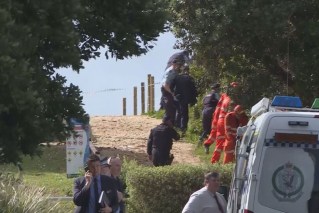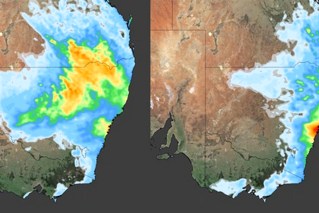Hurricane Fiona has slammed into eastern Canada, dragging homes out to sea, turning buildings into piles of rubble and leaving hundreds of thousands of people without power.
The powerful weather system could be one of the strongest storms that Canada has ever experienced, according to forecasters who described it as “a historic, extreme event”.
After smashing Nova Scotia and Prince Edward Island, and battering Newfoundland, it moved to the Gulf of St Lawrence.
The town of Port aux Basques, with a population of 4067 on the southwest tip of Newfoundland, declared a state of emergency and is evacuating parts of the town that suffered flooding and road washouts.
Several homes and an apartment building were dragged out to sea, Rene Roy, editor in chief if Wreckhouse Weekly in Port aux Basques, told the Canadian Broadcasting Corp.
“This is hands down the most terrifying thing I’ve ever seen in my life,” Mr Roy said.
Many homes are “just a pile of rubble in the ocean right now… There is an apartment building that’s literally gone. There are entire streets that are gone.”

The view from editor Rene Roy’s office. Photo: Wreckhouse Weekly Twitter
Mr Roy also told CNN said it was the worst storm he had experienced and he had so far counted eight homes swept away.
“I’ve lived through Hurricane Juan, and that was a foggy day compared to this monster.
“This is unreal.
“I have seen wind that has pulled trees out of the ground, homes swept away by water, homes that have been lost to the ocean.
“I’ve seen a boat in the middle of a playground. Cabins and swing sets floating by. It is surreal what is happening here.”
Police are investigating whether a woman had been swept to sea, CBC reported.
“This is hitting us really, really hard right now,” said Channel-Port aux Basques Mayor Brian Button in a video posted on Facebook in which he urged residents to stay indoors or, if asked, to evacuate.
“We have a fair bit of destruction in town… We do not need anyone else injured or hurt in during this.”
Hurricane Fiona, which nearly a week ago battered Puerto Rico and other parts of the Caribbean, killed at least eight and knocked out power for virtually all of Puerto Rico’s 3.3 million people during a sweltering heat wave.
It made landfall between Canso and Guysborough, Nova Scotia, where the Canadian Hurricane Centre said it recorded what may have been the lowest barometric pressure of any storm to hit land in the country’s history.
#Fiona is moving northeastward through the Gulf of St. Lawrence as hurricane force wind gusts continue over parts of southwestern Newfoundland. Find more information at: https://t.co/zTOlK3Hj6X pic.twitter.com/qAN9KLJTpM
— ECCC Canadian Hurricane Centre (@ECCC_CHC) September 24, 2022
Ian Hubbard, meteorologist for the Canadian Hurricane Centre, told Reuters it appears Fiona lived up to expectations that it would be a “historical” storm.
“It did look like it had the potential to break the all-time record in Canada, and it looks like it did,” he said. “We’re still not out of this yet.”
Sadly, can’t see this house in Burgeo area surviving the day. More astonishing video courtesy of my friend Steven Hiscock with Burgeo Broadcasting System. pic.twitter.com/W12HAvsUXA
— AnthonyGermain (@AnthonyGermain) September 24, 2022
Storms are not uncommon in the region and typically cross over rapidly, but Fiona is expected to maintain hurricane-force winds until Saturday afternoon and impact a very large area.
Some 79 per cent of customers, or 414,000, were without power in Nova Scotia, and 95 per cent, or 82,000, had lost power on Prince Edward Island, utility companies said.
Police across the region reported multiple road closures. The region was also experiencing spotty mobile phone service.
Canadian Prime Minister Justin Trudeau delayed Saturday’s departure for Japan, where he was to attend the funeral of former Prime Minister Shinzo Abe, to receive briefings and support the government’s emergency response.
“It’s going to be a bad one,” Prime Minister Justin Trudeau said on Friday. “We encourage everyone to stay safe and to listen to the instructions of local authorities and hang in there for the next 24 hours.”
-with AAP








